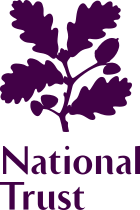National Trust of England
 |
|
| Abbreviation | National Trust |
|---|---|
| Motto | For ever, for everyone |
| Formation | 1895 |
| Legal status | Trust |
| Purpose | To look after Places of Historic Interest or Natural Beauty permanently for the benefit of the nation across England, Wales and Northern Ireland |
| Headquarters | Swindon, Wiltshire |
| Location |
|
|
Region served
|
England, Wales and Northern Ireland |
|
Membership
|
5.1 million (2017) |
|
Key people
|
H.R.H. The Prince of Wales (President) Dame Helen Ghosh (Director-General) Tim Parker (Chairman) |
|
Main organ
|
Board of trustees |
|
Revenue
|
£494 million (2014–15) |
|
Staff
|
5,899 |
|
Volunteers
|
62,000 |
| Website | www |
The National Trust for Places of Historic Interest or Natural Beauty, known as the National Trust (Irish: An Iontaobhas Náisiúnta, Ulster Scots: Tha Naitional Trust. Welsh: Yr Ymddiriedolaeth Genedlaethol), is a conservation organisation in England, Wales and Northern Ireland, and the largest membership organisation in the United Kingdom.
The trust describes itself as "a charity that works to preserve and protect historic places and spaces—for ever, for everyone." The trust was founded in 1895 and given statutory powers, starting with the National Trust Act 1907. Historically, the trust tended to focus on English country houses, which still make up the largest part of its holdings, but it also protects historic landscapes such as in the Lake District, historic urban properties, and nature reserves. In Scotland, there is an independent National Trust for Scotland. The Trust has special powers to prevent land being sold off or mortgaged, although this can be over-ridden by Parliament.
The National Trust has been the beneficiary of many large donations and bequests. It owns over 350 heritage properties, which includes many historic houses and gardens, industrial monuments, and social history sites. Most of these are open to the public, usually for a charge. Others are leased, on terms that manage to preserve their character. The Trust is one of the largest landowners in the United Kingdom, owning over 247,000 hectares (950 sq mi) of land, including many characteristic sites of natural beauty, most of which are open to the public free of charge.
The Trust, one of the largest UK charities financially, is funded by membership subscriptions, entrance fees, legacies, and revenue from gift shops and restaurants within its properties. It has been accused of focusing too much on country estates, and in recent years, the trust has sought to broaden its activities by acquiring historic properties such as former mills, early factories, workhouses, and the childhood homes of Paul McCartney and John Lennon.
...
Wikipedia
